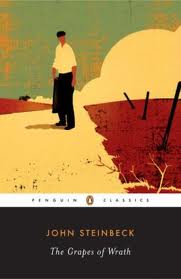Our book choice for October 2012 is The Grapes of Wrath by John Steinbeck. it tells the story of the Joad family, a poor tenant farming family from Oklahoma, as they are forced to leave their home during the Great Depression and migrate to California in search of work. The novel is set during the Dust Bowl, a period of severe dust storms and agricultural failures that devastated the American Midwest.
The Joad family is made up of Tom Joad, his parents, Ma and Pa, his siblings, Noah, Al, Rose of Sharon, and Ruthie, and his grandparents, Tía Juana and Tío John. Tom has just been released from prison after serving four years for manslaughter, and he is eager to return home to his family. When he arrives, he finds that his family has been forced to leave their farm after the bank foreclosed on it. The Joad family joins thousands of other migrant workers who are also migrating to California in search of work.
The journey to California is long and difficult. The Joads travel in a jalopy that is constantly breaking down. They are also harassed by the police and by local farmers who do not want them to come to California. Along the way, the Joads witness the poverty and suffering of other migrant workers. They see people dying of starvation, and they see children who are sick and malnourished.
When the Joads finally arrive in California, they find that the situation is even worse than they had imagined. The agricultural industry in California is controlled by a few large corporations, and these corporations exploit the migrant workers. The Joads are forced to work long hours for low wages, and they are often treated poorly.
Despite the hardships they face, the Joads never give up hope. They continue to work hard and to support each other. They also begin to organize with other migrant workers in an effort to improve their working conditions.
The Grapes of Wrath is a powerful novel that tells the story of the human spirit in the face of adversity. It is a story of hope, resilience, and the power of community. The novel was a critical and commercial success when it was first published in 1939, and it has since become one of the most important and influential novels in American literature.
Here are some additional details about the novel
- The title of the novel is a reference to the biblical book of Exodus, in which the Israelites are led out of Egypt by Moses. The title suggests that the Joad family is a modern-day Exodus, a group of people who are being forced to leave their homes in search of a better life.
- The novel is set in the Dust Bowl, a period of severe dust storms and agricultural failures that devastated the American Midwest during the 1930s. The Dust Bowl was caused by a combination of factors, including overgrazing, poor agricultural practices, and a series of droughts.
- The novel is narrated by an omniscient third-person narrator. This allows the narrator to provide insights into the thoughts and feelings of the characters, as well as to provide background information about the events of the novel.
- The novel is written in a realistic style. Steinbeck uses vivid language and imagery to describe the harsh realities of life for the Joad family and other migrant workers.
- The novel is a social protest novel. Steinbeck uses the novel to expose the injustices faced by migrant workers during the Great Depression. He also criticizes the agricultural industry in California for exploiting migrant workers.
- The novel was a critical and commercial success when it was first published in 1939. It won the National Book Award and the Pulitzer Prize for fiction. The novel has since been translated into over 40 languages and has sold over 14 million copies worldwide.
Discussion Questions
- Did you enjoy the book?
- Does the novel end with hope, or despair?
- The Grapes of Wrath was banned in Kern County, California (where the Joad family spend their time once reaching California). Why was the novel banned?
- What particular themes, scenes, or ideas may have prompted the banning?
- Who wanted the book banned?
- How does Steinbeck treat Oakies in the novel?
- Some people complain that they are treated poorly, as if they are stupid.
- Some people claim that they are the true heroes of the book.
- Is The Grapes of Wrath still relevant today? Why or why not?
- Have working conditions changed?
- The Grapes of Wrath warns that change is coming – revolution perhaps. Did change come? Was it revolutionary (even if it was not a revolution)?
- Why read The Grapes of Wrath today?
- To whom would you recommend the book?
Individual Ratings
DKB Rating 




Anthony Rating 




EmmaT Rating 




Sue Rating 





